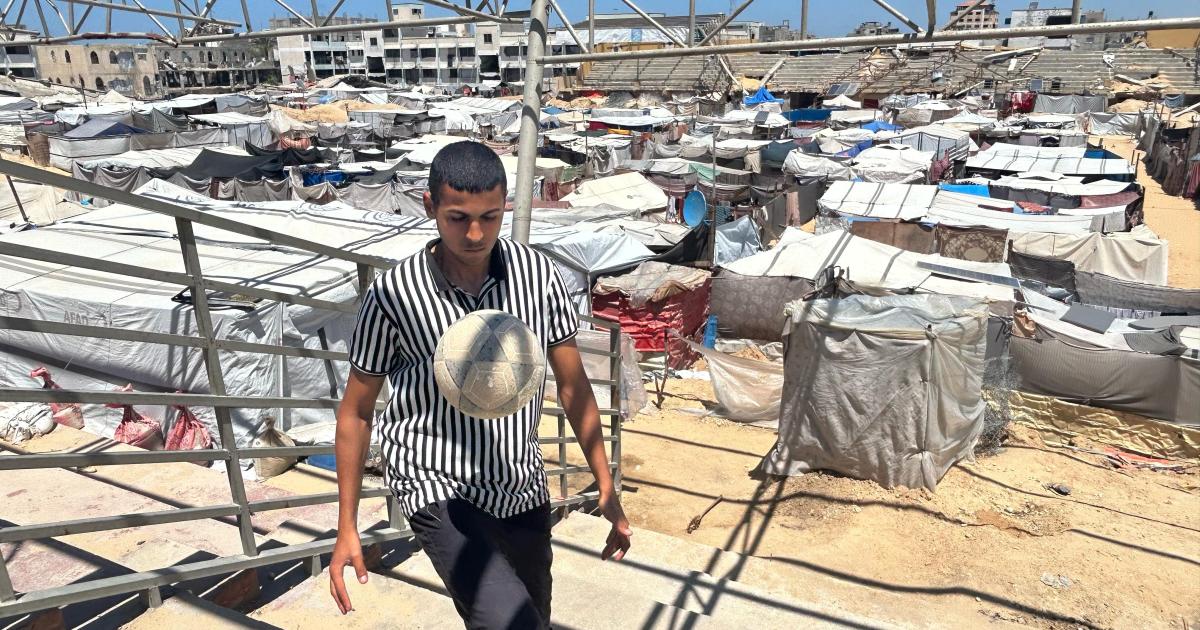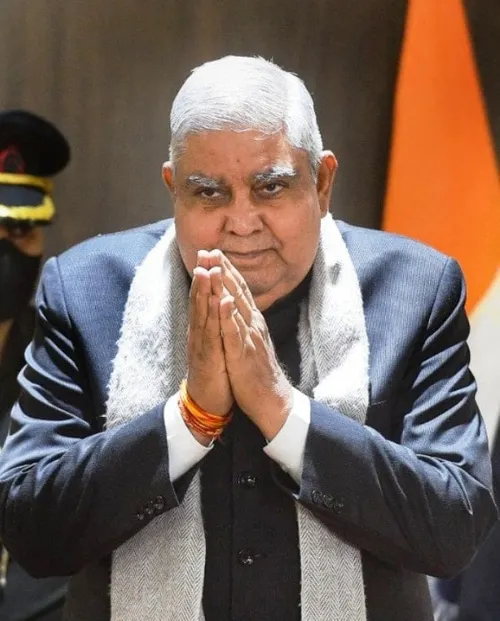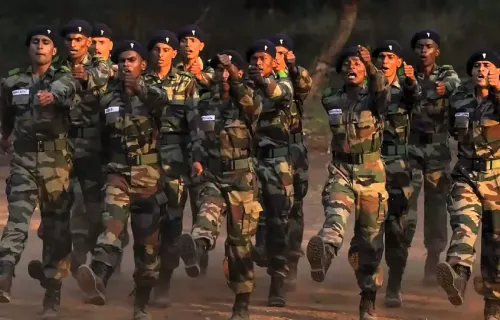Khan Younis, Gaza – In the ruins of his home in Khan Younis, 75-year-old Shaker Safi gently thumbs through fading photographs of his son Mohammed’s sporting career.
Medals, trophies, team huddles, and group photos of young athletes coached by Mohammed now serve as a haunting memorial to a dream destroyed by war.
On November 15, 2023, Mohammed Safi – a football coach and physical education teacher – was killed in an Israeli air strike.
He had spent years building a legacy of hope through sport, training at schools and community clubs, and transforming underdog teams into local champions.
A graduate in physical education from Al-Aqsa University, Mohammed was the head coach of Al-Amal Football Club in southern Gaza and was widely admired for his work nurturing young talent aged between six and 16.
“My son dreamt of representing Palestine internationally,” Shaker says, surrounded by remnants of his son’s accolades. “He believed sport could lift youth from despair. But war reached him before he could reach the world.”

Now displaced, Mohammed’s wife Nermeen and their four children – 16-year-old Shaker Jr, Amir, 14, Alma, 11, and Taif, 7 – live with the painful void created by his death.
The children cling to their father’s last football and coaching notes as keepsakes.
Nermeen, an art teacher, gently wipes away Taif’s tears when she asks, “Why did they take Daddy from us?”
“He was a man of dreams, not politics,” Nermeen says. “He wanted to become an international referee. He wanted his master’s degree. Instead, he was killed for being a symbol of life and youth.”
Mohammed Safi is one of hundreds of athletes and sports professionals who have been killed or displaced since the war began.
According to the Palestinian Olympic Committee, 582 athletes have been killed since October 7, 2023, many of them national team players, coaches, and administrators.

Sports replaced by survival
For those who remain alive in Gaza, survival has replaced sporting ambition.
Yousef Abu Shawarib is a 20-year-old goalkeeper for Rafah’s premier league football club.
In May 2024, he and his family fled their home and took shelter at Khan Younis Stadium – the same field where he once played official matches.
Today, the stadium is a shelter for displaced families, its synthetic turf now lined with tents instead of players.
“This is where my coach used to brief me before games,” Yousef says, standing near what used to be the bench area, now a water distribution point. “Now I wait here for water, not for kickoff.”
His routine today involves light, irregular training inside his tent, hoping to preserve a fraction of his fitness. But his dreams of studying sports sciences in Germany and playing professionally are gone.
“Now, I only hope we have something to eat tomorrow,” he tells Al Jazeera. “The war didn’t just destroy fields – it destroyed our futures.”
When he looks at the charred stadium, he doesn’t see a temporary displacement.
“This was not collateral damage. It was systematic. It’s like they want to erase everything about us – even our games.”

Hope beneath the rubble
Still, like the patches of grass that survived the blasts, some hope remains.
Shadi Abu Armanah, head coach of Palestine’s amputee football team, had devised a six-month plan to resume training.
His 25 players and five coaching staff had been building momentum before the war on Gaza. The team had competed internationally, including in a 2019 tournament in France. Before hostilities began, they were preparing for another event in November 2023 and an event in West Asia set for October 2025.
“Now, we can’t even gather,” Shadi says. “Every facility we used has been destroyed. The players have lost their homes. Most have lost loved ones. There’s nowhere safe to train – no gear, no field, nothing.”
Supported by the International Committee of the Red Cross, the team had once symbolised resilience. Training sessions were more than drills – they were lifelines. “For amputees, sport was a second chance,” Shadi says. “Now they are just trying to survive.”
Shadi himself is displaced. His home, too, was bombed. “The clubs I worked for are gone. The players are either dead or scattered. If the war ends today, we’ll still need years to bring back even a fraction of what was lost.”
He adds, “I coached across many clubs and divisions. Almost all their facilities have been reduced to rubble. It’s not just a pause – it’s erasure.”

A systematic erasure
The scope of devastation extends beyond personal loss.
According to Asaad al-Majdalawi, vice president of the Palestinian Olympic Committee, Gaza’s entire sporting infrastructure is on the brink of collapse. At least 270 sports facilities have been damaged or destroyed: 189 completely flattened and 81 partially damaged, with initial estimates of material losses in the hundreds of millions of dollars.
“Every major component of Gaza’s sports system has been hit,” al-Majdalawi told Al Jazeera. “The Olympic Committee offices, sports federations, clubs, school and university sports programmes – even private sports facilities have been targeted. It’s a comprehensive assault.”
Among the fallen are high-profile athletes like Nagham Abu Samra, Palestine’s international karate champion; Majed Abu Maraheel, the first Palestinian to carry the Olympic flag at the 1996 Atlanta Games; Olympic football coach Hani al-Masdar; and national athletics coach Bilal Abu Sam’an. Hundreds of others remain injured or missing, complicating accurate assessments.
“This is not just loss – it’s extermination,” al-Majdalawi says. “Each athlete was a community pillar. They weren’t numbers. They were symbols of hope, unity, and perseverance. Losing them has deeply wounded the Palestinian society.”
He warns that beyond the immediate human toll, the interruption of sports activities for a year and a half will result in physical, psychological, and professional regression for remaining athletes. “You lose more than muscle and skill – you lose purpose.”

A global silence
Al-Majdalawi believes the international response has been alarmingly inadequate. When Gaza’s sports community reaches out to global federations, Olympic bodies, and ministers of youth and sport, they’re met with silence.
“In private, many international officials sympathise,” he says. “But at the decision-making level, Israel seems to operate above the law. There’s no accountability. It’s like sport doesn’t matter when it’s Palestinian. The global and international sports institutions appear complicit through their silence, ignoring all international laws, human rights, and the governing rules of the international sports system,” he says.
He believes that if the war ended today, it would still take five to 10 years to rebuild what has been lost. Even that gloomy timeline is based on the assumption that the blockade ends and international funding becomes available.
“We have been building this sports sector since 1994,” al-Majdalawi says. “It took us decades to accumulate knowledge, experience, and professionalism. Now, it’s all been levelled in months.”
As the war continues, the fate of Gaza’s sports sector hangs by a thread. Yet amid the ruins, fathers like Shaker Safi, athletes like Yousef, and coaches like Shadi hold on to one unyielding belief: that sport will once again be a source of hope, identity, and life for Palestinians.

This piece was published in collaboration with Egab.
Anurag Dhole is a seasoned journalist and content writer with a passion for delivering timely, accurate, and engaging stories. With over 8 years of experience in digital media, she covers a wide range of topics—from breaking news and politics to business insights and cultural trends. Jane's writing style blends clarity with depth, aiming to inform and inspire readers in a fast-paced media landscape. When she’s not chasing stories, she’s likely reading investigative features or exploring local cafés for her next writing spot.






